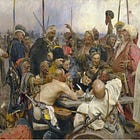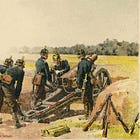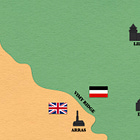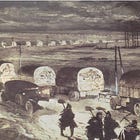
In the second semester of 1917, the French Army devoted the lion’s share of its efforts to the training of men and units, the promulgation of new techniques, and the acquisition of new weapons. At the same time, it conducted a number of ‘attacks with limited objectives’ in which the extravagant expenditure of artillery projectiles would, while economizing on the lives and limbs of French soldiers, kill or wound a much larger number of Germans.
In an article posted to his blog, Michel Goya argues that the armed forces of Ukraine would do well to adopt a similar ‘strategy of healing and defense’.1 In the realm of combat development, he recommends that Ukraine extend conscription to young men (such as university students and athletes) who currently enjoy exemptions; unite its patchwork of autonomous land warfare services into a single army, rationalize the organization of its formations, and train the general staffs of brigades, divisions, and army corps. However, instead of ‘bite and hold’ attacks, which he believes would invite strong Russian counter-attacks, Colonel Goya recommends ‘raids and strikes against high value targets.’2
Whether or not the Ukrainian leadership takes Goya’s advice remains to be seen. However, when I look back at the last year or so of the war in Ukraine, it seems that the Russians have already adopted an approach that borrows much from the directive Philippe Pétain issued upon taking command of the French armies in the field. ‘Instead of deep attacks, we should prefer attacks with limited objectives, launched suddenly against fronts that can be properly bombarded with the amount, and types, of artillery we have at hand.’3
As might be imagined, the methods used by Russian forces in the past few months echo, rather than mimic, those promulgated by General Pétain in May of 1917. For one thing, where each French attack both followed and inaugurated periods of relative calm, the Russian attacks are often conducted as part of a long series of such undertakings. For another, while the French attacks invariably sought the seizure of a wide but narrow piece of ground, the Russian sequences have often been used to conduct slow-motion envelopments. Finally, where stand-alone bite-and-hold attacks of the French Army were done and dusted in a day or two, the maneuvers composed of their Russian counterparts have sometimes taken weeks to complete.
For further reading:
To share, subscribe, or support:
The phrase ‘strategy of healing and defense' comes from the title of Chapter 8 of Robert A. Doughty Pyrrhic Victory: French Strategy and Operations in the Great War (Cambridge: Harvard University Press, 2005).
‘À l’est rien de nouveau?’ [‘Nothing New on the Eastern Front?’] La Voie de l’Épée [The Way of the Sword] (February 2024) The name of the article recalls the title, À l’ouest rien de nouveau, of the French translation famous novel of Erich Maria Remarque, Im Westen Nichts Neues [‘Nothing New on the Western Front’, usually rendered as All Quiet on the Western Front].
Directive Number 1 of 19 May 1917, reprinted as an annex to the French official history: Les Armées Françaises dans la Grande Guerre, Tome V, 2e Volume, Annexes, 1er Volume (Paris: Imprimerie Nationale, 1937) page 391. My own translation of the complete document can be found in Pétain Explains Attrition.










The Russians may figure they can win this war by not losing. That will lead them to take a low risk approach. If you surveyed experts, five years ago, how many of them would’ve said that we can learn valuable lessons for the largest ongoing contemporary war from General Petain? Zero, probably.
(I am reminded of the story of Charles DeGaulle, visiting a dying general Pershing in Walter Reed Army Hospital. Pershing was not entirely lucid, and at one point he asked general DeGaulle how his old friend Marshall Petain was doing. General DeGaulle, the embodiment of exquisite French tact, responded that the last time he saw the Marshall he was well.)
The Russians do like slow motion envelopments.
Slow boil Kettles?
Kessel langsam kochen?
>langsamer Kessel< 👍🏻
need something catchy, this will happen again.